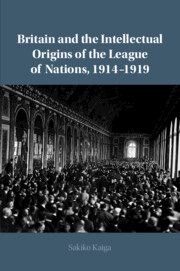Book contents
- Britain and the Intellectual Origins of the League of Nations, 1914–1919
- Britain and the Intellectual Origins of the League of Nations, 1914–1919
- Copyright page
- Contents
- Acknowledgements
- Abbreviations
- Introduction
- 1 Precursors
- 2 The Use of Force to Prevent War?
- 3 Strategies for Winning Public Opinion
- 4 A Transnational Movement?
- 5 No Peace without Victory
- Conclusion
- Appendix
- Bibliography
- Index
1 - Precursors
Thinking about War and Peace before 1914
Published online by Cambridge University Press: 27 April 2021
- Britain and the Intellectual Origins of the League of Nations, 1914–1919
- Britain and the Intellectual Origins of the League of Nations, 1914–1919
- Copyright page
- Contents
- Acknowledgements
- Abbreviations
- Introduction
- 1 Precursors
- 2 The Use of Force to Prevent War?
- 3 Strategies for Winning Public Opinion
- 4 A Transnational Movement?
- 5 No Peace without Victory
- Conclusion
- Appendix
- Bibliography
- Index
Summary
Chapter 1 examines the social and intellectual backgrounds of the pro-league of nations movement. Although previous research has focused on the movement’s activity predominantly during the inter-war period, the post-war plan emerged from an older European intellectual tradition. This chapter, therefore, contextualises the pro-league movement into this rich legacy by exploring two broader contexts: the immediate backdrop to the evolution of the movement and the history of ideas about war and peace. In the pre-1914 period, the future pro-league activists already had networks of influence that became the basis of a pro-league movement. While they drew upon a European intellectual legacy, the problems they faced differed from those of their predecessors – the breakdown of the Concert of Europe and the rise of nationalism. These problems led the pro-leaguers to not only develop fresh perspectives on the causes of war, but also conclude that a new world order should be established.
Keywords
- Type
- Chapter
- Information
- Publisher: Cambridge University PressPrint publication year: 2021

